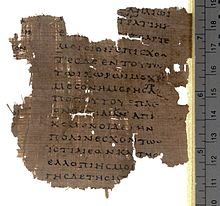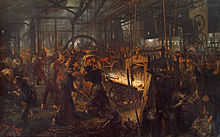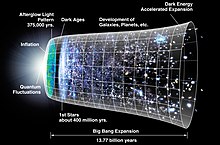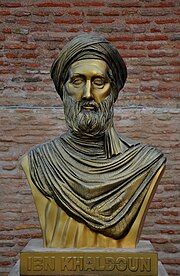History
History emerged as a field of inquiry in the ancient period to replace myth-infused narratives, with influential early traditions originating in Greece, China, and later also in the Islamic world.Often motivated by specific ideological agendas, pseudohistorians mimic historical methodology to promote misleading narratives that lack rigorous analysis and scholarly consensus.[d] This view emphasizes that the disinterested pursuit of truth is an end in itself, while external purposes, associated with ideology or politics, threaten to undermine the accuracy of historical research by distorting the past.[17] History can also foster social cohesion by providing people with a collective identity through a shared past, helping to preserve and cultivate cultural heritage and values across generations.[18] History is sometimes used for political or ideological purposes, for instance, to justify the status quo by emphasising the respectability of certain traditions or to promote change by highlighting past injustices.[19] Pushed to extreme forms, this can result in pseudohistory or historical denialism when evidence is intentionally ignored or misinterpreted to construct a misleading narrative serving external interests.In Hellenistic and Roman times, the meaning of the term shifted, placing more emphasis on narrative aspects and the art of presentation rather than focusing on investigation and testimony.Different periods are often defined based on dominant themes that characterize a specific time frame and significant events that initiated these developments or brought them to an end.Thanks to advancements in agriculture, surplus food allowed these civilizations to support larger populations, accompanied by urbanization, the establishment of trade networks, and the emergence of regional empires.[40] Geography plays a central role in history through its influence on food production, natural resources, economic activities, political boundaries, and cultural interactions.[49] Among rising nationalism, African states gradually gained independence in the aftermath of World War II, a period that saw economic progress, rapid population growth, and struggles for political stability.[52] In the following millennia, all major world religions and several influential philosophical traditions were conceived and spread, such as Hinduism, Buddhism, Confucianism, Taoism, Christianity, and Islam.It covers economic aspects such as the use of land, labour, and capital, the supply and demand of goods, the costs and means of production, and the distribution of income and wealth.Some theorists understand it as the study of everyday life outside the domains of politics and economics, including cultural practices, family structures, community interactions, and education.[96] The terms macrohistory, mesohistory, and microhistory refer to different scales of analysis, ranging from large-scale patterns that affect the whole globe to detailed studies of local contexts, small communities, family histories, particular individuals, or specific events.Thanks to technological advances, historians increasingly rely on online resources, which offer vast digital databases with efficient methods to search and access specific documents.[138] Of particular influence was the work of Sima Qian (c. 145–86/85 BCE), whose meticulous research method and inclusion of alternative viewpoints shaped subsequent historiographical standards.Christian historians drew from Greco-Roman and Jewish traditions and reinterpreted the past from a religious perspective as a narrative highlighting God's divine plan.Historians tried to uncover deeper patterns and meaning in the past while the scope of historical inquiry expanded to include societal and economic topics as well as comparisons between different cultures.Following the work of Leopold von Ranke (1795–1886), a systematic method of source criticism was widely accepted while academic institutions dedicated to history were established in the form of university departments, professional associations, and journals.[156] Building on the philosophy of Georg Wilhelm Friedrich Hegel (1770–1831), Karl Marx (1818–1883) described one such general law, arguing that economic forces and class struggles are the fundamental drivers of historical change.[169] For example, they examine the characteristics of the Annales school, like its use of quantitative data from various disciplines and its interest in economic and social developments taking place over extended periods.Some approaches rely primarily on the beliefs and actions of individual humans, while others include collective and other general entities, such as civilizations, institutions, ideologies, and social forces.Various philosophers argue that this ideal is not achievable, pointing to the subjective nature of interpretation, the narrative aspect of history, and the influence of personal values on the perspective and actions of both historic individuals and historians.[183] It often takes a narrative form by presenting children with simple stories, which may focus on historic individuals or the origins of local holidays, festivals, and food.[186] Traditional methodologies in history education often present numerous facts, like dates of significant events and names of historical figures, which students are expected to memorize.By making students aware of significant developments in the past, they become familiar with various contexts of human life, helping them understand the present and its diverse cultures.[191] It includes popular history, which aims to make the past accessible and appealing to a wide audience of non-specialists in media such as books, television programmes, and online content.[196] Geology and other earth sciences help historians understand the environmental contexts and physical processes that affected past societies, including climate conditions, landscapes, and natural events.[199] Historical linguistics studies the development of languages over time, which can be crucial for the interpretation of ancient documents and can also provide information about migration patterns and cultural exchanges.











Human historyHistory of EarthHistory (disambiguation)OutlineGlossaryArcheologyChronologyCommon Eraanno DominiGregorian calendarHistorical methodHistoriographyPeriodizationRecorded historyHistorical sourceprimarysecondarytertiaryPrehistoryAncient historyBronze Ageclassical antiquityPost-classical historyEarly Middle AgesHigh Middle AgesLate Middle AgesModern historyearly modern historylate modern historycontemporary historyAfricaAntarcticaAustraliaCentral AmericaEast AsiaEuropeMiddle EastNew ZealandNorth AmericaPacific IslandsSouth AmericaSouth AsiaSoutheast AsiaThe CaribbeanhistoriansBan GuBan ZhaoGibbonHerodotusIbn KhaldunIsidoreJosephusManethoPlutarchPolybiusSallustSuetoniusTacitusTaylorThucydidesXenophonPrehistoricAncientPost-classicalModernFutureacademic disciplineevidencenarrativeshuman pastsocial sciencehumanitiestime periodsgeographichistory of Africapolitical historysocial historyeconomic historyquantitative historycomparative historyoral historyHistorical researchsecondary sourcesSource criticismpositivismAnnales schoolMarxismpostmodernismmethodologicalancient periodGreeceIslamic worldphilosophyeducationpoliticscausalhuman motivescountable nouninterpretationchroniclesinvention of writingarchaeologyhypothesesstorytellingcultural heritagepseudohistoryideological agendashistorical methodologyend in itselfdecision-makinghuman conditionhuman behavioursocial cohesioncollective identityhistorical denialismThe HistoriesAncient GreekClassical LatinHellenisticRoman timesMiddle EnglishOld FrenchperiodsChinese historymain dynastiespre-Columbian